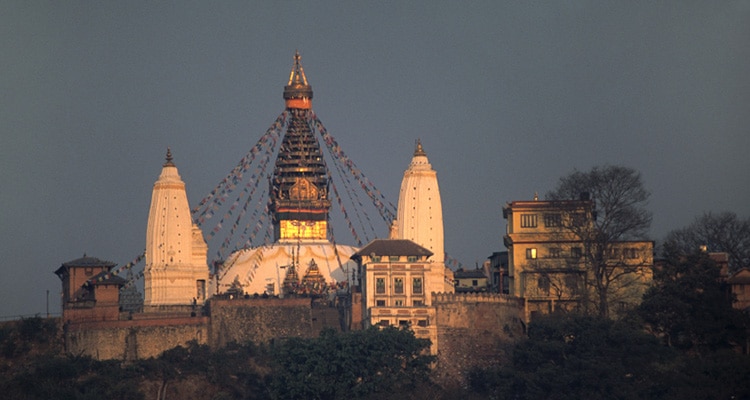The 6 Realms of Being in Buddhism
Category: Buddhist Path | Mind Trainer Articles

How perceptions and projections define our experience of the world
A fundamental tenet of the Buddha’s teachings is that our experience of reality is based on our state of mind. In other words, instead of there being a concrete, absolute reality out there, our experience is defined by our karma and our current mindset, which, in turn, is rooted in our previous habits and actions. The Buddha described six main forms of experience: the six realms of being.
Firstly, let us remember that karma is not fate, it is volitional action—meaning that there is an intention behind it—and because of this there are consequences. Motivation is very important here. Volitional actions, when repeated, create habits. So if you tend to be angry now and you reinforce that tendency, you will naturally be disposed to anger again in the future. Conversely, if your tendency is compassion or patience, you will create the causes for similar virtuous habits to manifest again in the future. Repeating these positive or negative actions and reactions again and again over many lifetimes reinforces patterns of experiencing the world in a particular way. This is how we create the world we live in.
This doesn’t mean that atoms and tables and chairs and houses are nothing more than projections. It means that what we perceive is much more a function of our mindset than of what is truly out there. Our state of mind filters our sense perceptions. And in fact our sense perceptions filter what we think is “out there.” If you’re driving and you’re hungry, all you’re going to see is billboards and signs for restaurants, right? If you’re angry or irritated, everything annoys you. The cat, a trash can, your neighbor, it doesn’t matter what it is: it’s all irritating. Your world, your reality, is being colored by your state of mind.
What are the six realms in Buddhism?
The presentation of the six realms is very much a description of different styles of perceiving reality. What are the six realms? Traditionally, there are three higher realms:
- gods
- demi-gods, also called jealous gods or asuras
- humans
and three lower realms:
- animals
- hungry ghosts or pretas
- hell beings
Although suffering pervades all six, there is more comfort and pleasure in the higher realms, and more suffering in the lower realms.
These realms can be understood literally or figuratively. The Buddha’s teachings present them as what we would consider actual states of being. They also have a psychological description or dimension. Each of the six realms or ways of perceiving reality is dependent upon our karma, each one has a particular negative emotion that is associated with it, and each one has its own particular kind of suffering.
As you would expect, the least amount of suffering is in the god realm. There are several types of god realm, all of which are very pleasurable. Some resemble what we might think of as paradise, while others are exceedingly deep and rather oblivious states of meditative absorption. There is a very strong sense of self-satisfaction with no awareness of suffering until the particular karma that has led to rebirth there has been exhausted. When this happens, there’s no escaping a change, a “fall” towards the other, lower realms, and the suffering this generates is said to be unimaginably and unbearably intense.
The next upper realm is that of the jealous gods or asuras. Jealousy is actually a wide set of emotions based on competitiveness, comparison, and also paranoia. Asuras are constantly trying to be better than others—they envy the gods, for example—and to get what they have. There’s paranoia, because the beings in that realm believe that others want what they themselves have or desire and are trying to get ahead of them. They don’t listen to each other—it’s a very uncommunicative realm where there’s a lot of fighting. Most of the suffering comes from the claustrophobia of paranoia and the constant jousting and clashes.
In the human realm, birth, aging, sickness, and death are obvious and inescapable forms of suffering. Awareness of this led the Buddha to commit himself fully to his spiritual practice and, ultimately, to break free of this cycle.
As humans, there’s the suffering of not getting what we want, having something and realizing it isn’t what we want, and the inevitable suffering of change: any pleasure or comfort we achieve is impermanent; it’s bound to disappear. Yet the human realm is rooted in desire-attachment. We’re discriminating about which desired thing should lead to perfect happiness, be it a better car, more money, idyllic relationships, whatever. There’s a lot of intellectual scheming in the human realm, which is characterized by our constant struggle to find ways to be comfortable, to avoid suffering, and to be as happy as possible.
The lower realms start with the animal realm, which is characterized by ignorance. Generally speaking, animals’ main focus is to eat, to avoid being eaten, and to reproduce. I know animal lovers will argue that animals are intelligent, but they are not intelligent like we humans are. You cannot teach a dog about cause and effect or how to work with mind. It is very difficult for a dog or any other non-human animal to deliberately improve their karma.
Then we have the realm of the hungry ghosts, depicted as having enormous bellies and disproportionately small mouths and necks. They suffer from tremendous hunger and thirst but their cravings can never be satisfied. Even if a being in the hungry ghost realm had a pile of food in front of them, the possibility of being satiated wouldn’t even occur to them. The intensity of their poverty and need and the habit of hunger imprisons them.
Finally, there are the hell realms where beings experience tremendous anger and aggression. When a being is consumed by that much anger, everything they experience is a manifestation of aggression and hatred. There is no respite from pain and suffering in the hells. There are hot hells, with flames, molten iron, and so on, and cold hells which are unbearably cold.
In Buddhism, these realms are seen as actual states that we can be reborn into. And due to our actions and their consequences, all of us have been reborn since beginningless time in one or another of the six realms of samsara: of conditioned and painful existence. One reason why the teachings of karma are so important is that once we’ve understood that virtuous intentions and actions are the cause of rebirth in the upper realms and negative intentions and actions are the causes for rebirth in the lower realms, we can train our minds and act accordingly.
The 6 realms as psychological states of mind
Especially in the West, a lot of people wonder if the hells and other realms are “real” or if the Buddha described them to frighten us into virtue. It’s a very interesting question and it takes a lot of contemplation to understand the answer. From an absolute point of view, no, the hells do not exist. There are just simply the hallucinatory projections of the beings who have the habitual patterns and negative karma to be reborn there. But from the perspective of the hell beings themselves, their suffering is excruciating, incessant, and very real.
If we take the question a little further, we could ask, is the human realm real? What about the animal realm? What about the god realm? Are any of these real? It’s the same answer: from an ultimate point of view, no. This human realm is the hallucination of the beings who are experiencing it (laughs). “Hallucination” in this sense refers to the karmic predisposition to experience the world in a certain way. Every being in every realm has the propensity to experience their world in a particular way. This is a very profound teaching that bears reflection.
For instance, think about how beings in different realms experience water. In our human realm, water is wet. We drink it, we can bathe in it. In the realm of the gods, that same water is perceived as being ambrosia, or nectar—the most pleasurable drink possible. For a fish, water is home. Like air for us, it’s simply the medium in which they move. Beings in the hungry ghost realm don’t see water the way we do; they perceive it as being disgusting, like pus or blood. Even though they’re chronically thirsty, they aren’t attracted to water because it repulses them. And in the hell realm, water manifests as another form of aggression, like molten iron. It may be just plain water to us, but beings experience it in very different ways based on their karmic proclivity.
Do we only experience the six realms of existence when, after death, we’re reborn into another life? Well, that’s certainly one aspect, but we can also relate to them as psychological states that we go through every day. There are similarities between our own anger and the hell realms, for example—when we experience intense anger, it’s like the whole world is attacking us. And when we are stuck in a poverty mentality, it doesn’t matter what we possess, our hunger cannot be satiated.
If we are basically ignoring our reality, nothing is going to get through; it’s an animal realm type of experience. You wag your tail, lick your paws, and turn on the TV or whatever it is you do to drown out the world. Then you notice you’ve been on the couch watching TV for way too long, right? I think we’ve all experienced this at a certain point. You befuddle yourself in your own cocoon.
We all know the pleasure-seeking and pain-avoidance of the human realm. And we can acknowledge the experience of jealousy when other people have something we want. Like jealous gods, we put them down or try to compete with them, or we push others away in an attempt to get what we want. It’s a very aggressive/defensive way of relating with the world.
Sometimes we might have a god realm kind of moment where we feel a tremendous sense of happiness. We think, wow, this is incredible… and somehow we convince ourselves that it will never end. God realm—wow, I’ve made it!
The emotions associated with the six realms are not so different from what we might experience many, many times in a day. Through studying and understanding them, we begin to notice our patterns and habits. Then we can gradually begin to unwind and refrain from perpetuating the causes of suffering in this life and in lives to come.








